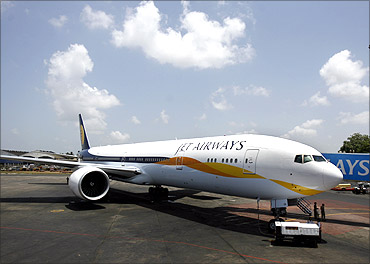IndiGo, Jet, SpiceJet and GoAir demand level playing field in aviation policy, say government can't favour only two new airlines.
 Four of the country's biggest private airlines, which together control over 90 per cent of the industry, have threatened to take the government to court if the draft civil aviation policy, which they say is designed to benefit only two new airlines, is finalised without taking their concerns into account.
Four of the country's biggest private airlines, which together control over 90 per cent of the industry, have threatened to take the government to court if the draft civil aviation policy, which they say is designed to benefit only two new airlines, is finalised without taking their concerns into account.
The airlines - IndiGo, Jet Airways, SpiceJet and GoAir - are mainly concerned about three components of the draft policy, the proposed abolition of the 5/20 rule, which requires an airline to have five years of domestic flying experience and 20 aircraft in its fleet before it can fly to overseas destinations, auctioning of bilateral rights and lifting the foreign ownership cap on domestic airlines above 49 per cent.
Federation of Indian Airlines (FIA), the body which represents the airlines in its submission to the civil aviation ministry, has added a copy from Justice Srikrishna who suggested the changes as violation of constitutional rights.
"In my opinion, if the draft policy is implemented in its present form, the querist would be entitled to challenge the same ground of hostile discrimination and infringement of their fundamental right by way of appropriate proceedings before a court," Justice Srikrishna wrote.
Top executives of IndiGo, Jet and GoAir and a representative of Jet said in New Delhi on Tuesday that they were particularly miffed with the ministry's persistent refusal to allow them to present their views about an important policy.
Rahul Bhatia, chairman of FIA, told Business Standard that a legal recourse would be a possible option. "We don't want legal battles but if the ministry is not ready to listen to us, what's the option? We just want a level-playing field," he said.
The older airlines say that any decision on 5/20 rule must be taken in tandem with the Route Development Guidelines and not as an independent entity.
In the draft policy, the ministry has suggested doing away with the 5/20 rule and replacing with a credit-based system.
The route development guidelines mandate airlines to deploy a certain amount of fleet in unprofitable, remote areas like the Northeast and Ladakh and airlines have to take prior permission before withdrawing any flight.
"If 5/20 is abolished, route dispersal guidelines should go too," said Ajay Singh, chairman of SpiceJet.
"While an IndiGo with more than 100 aircraft cannot restructure its network by withdrawing from any unprofitable routes, an airline with just five aircraft can fly abroad with the sixth one - this is not acceptable," said Aditya Ghosh, president of InterGlobe Aviation, which runs Indigo.
"By merely abolishing the 5/20 rule and keeping the route development guidelines intact, the government will completely will tilt the balance in favour of airlines which are effectively controlled from abroad," said Singh.
GoAir CEO Wolfgang Prock-Schauer said the "proposed changes are regressive and would harm Indian aviation."
FIA has also vociferously opposed any move to auction bilateral rights which they feel will put them at an disadvantage and lead to unfair competition with airlines from Gulf or the European Union which have deep pockets.
"Every country, including the US and Singapore, zealously guards its bilateral traffic rights. With auctioning of these, India will put its airlines at a disadvantage," said Singh.
Gulf carriers like Etihad and Emirates have already increased their footprint manifold after the previous government gave greater freedom to them - a move that was criticised by the Comptroller and Auditor General in its audit report.
Responding to former Tata Group Chairman Ratan Tata's statement on Sunday that older airlines were resisting changes in fear of competition, Bhatia wondered why Tata, known for his wisdom, had become so vocal on an issue where he had a vested interest.
The biggest beneficiaries from the proposed changes are likely to be Vistara and AirAsia in which Tata Sons owns substantial stake.
FIA said substantial ownership and effective control norms were being flouted by the foreign partners of new airlines Vistara and AirAsia. AirAsia co-founder Arun Bhatia had earlier threatened to go to court on grounds that it is remote controlled by Malaysian shareholders.











 © 2025
© 2025